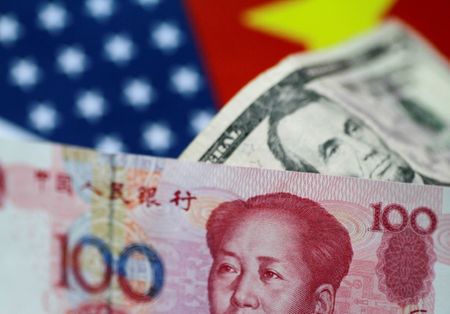
Investing.com– Most Asian currencies edged lower on Tuesday and headed for yearly losses as the dollar remained strong heading into 2025, while the Chinese yuan weakened after data showed the country’s factory activity expanding at a slower pace.
The was 0.1% weaker in Asian trade but remained near a 2-year high it touched earlier in the month. The also ticked lower.
Asian currencies have weakened sharply this year as the Federal Reserve’s interest rate outlook, and fears about a potential U.S-China trade war under Donald Trump’s administration, have eroded risk sentiment.
The Fed’s recent signal of fewer cuts in 2025 has provided renewed strength to the dollar and created downward pressure on Asian currencies.
Chinese yuan slips as factory activity expands at a slower-than-expected pace
The Chinese yuan’s onshore pair rose 0.2% on Tuesday, while the offshore pair was largely unchanged.
China’s expanded for a third straight month in December as a raft of fresh stimulus measures continued to provide support, purchasing managers index data showed on Tuesday. However, the rise was slightly lower than market expectations and below the previous month’s reading.
Markets are holding out for more clarity on Beijing’s plans for stimulus measures in the coming year. Recent reports suggested that the country will ramp up fiscal spending to support economic growth.
Asian currencies set for yearly declines
The Japanese yen’s pair fell 0.3% on Tuesday after it reached a five-month high in the previous session. The yen was set to lose more than 10% against the U.S. dollar for the year.
The Singapore dollar’s pair was largely unchanged but headed for a yearly rise.
The Australian dollar’s was slightly lower on Tuesday.
The Indian rupee’s pair inched up 0.1%, and was on track to rise more than 3% this year. The rupee has been hitting fresh record lows against the U.S. dollar this month.
The Thai baht’s pair rose 0.3%, while the Indonesian rupiah’s pair gained 0.2% on Tuesday.
South Korean won slips amid deepening political unrest
The South Korean won’s pair edged up 0.1% on Tuesday. The won has weakened nearly 6% against the U.S. Dollar in December, which saw a failed imposition of martial law in the country.
The won is the worst-performing currency amongst its Asian peers, tracking an over 12% decline in 2024.
In the latest updates, A South Korean court approved an arrest warrant on Tuesday for President Yoon Suk Yeol, who has been impeached and suspended from office following his December 3 decision to impose martial law.
The Corruption Investigation Office for High-ranking Officials (CIO) stated that the Seoul Western District Court granted the warrant sought by investigators probing Yoon’s brief imposition of martial law.
